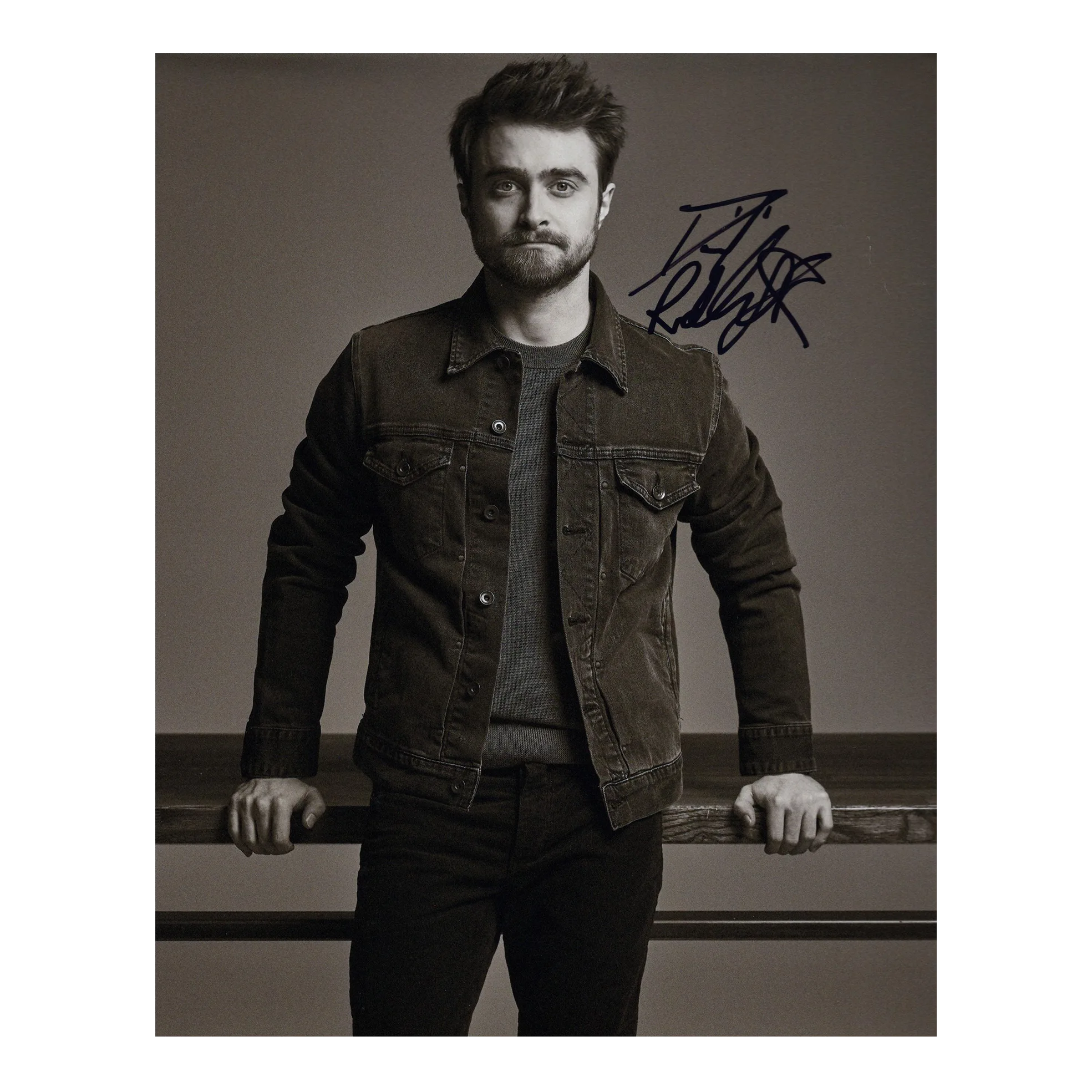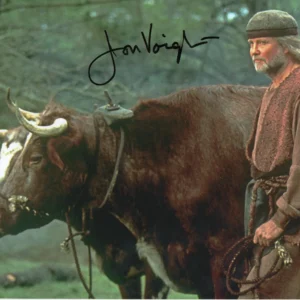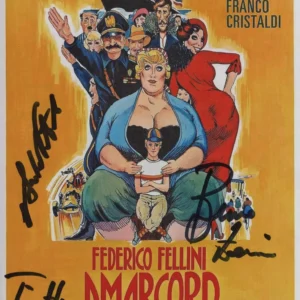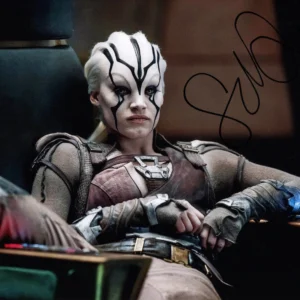Description
Daniel Jacob Radcliffe (born 23 July 1989) is an English actor. He is best known for his role as Harry Potter in the film series of the same name, and has received numerous awards and nominations. Radcliffe made his acting debut at age 10 in the BBC One television film David Copperfield (1999), followed by his feature film debut in The Tailor of Panama (2001). The same year, he starred in Harry Potter and the Philosopher’s Stone. Over the next decade, he played the titular role in seven sequels, culminating with Harry Potter and the Deathly Hallows – Part 2 (2011). During this period, he became one of the world’s highest-paid actors and gained worldwide fame, popularity, and critical acclaim. Following the success of Harry Potter, Radcliffe played lawyer Arthur Kipps in the horror film The Woman in Black (2012), poet Allen Ginsberg in the biographical drama film Kill Your Darlings (2013), the title character’s assistant Igor in the science-fiction fantasy film Victor Frankenstein (2015), a sentient corpse in the comedy-drama film Swiss Army Man (2016), technological prodigy Walter Mabry in the heist thriller film Now You See Me 2 (2016), and FBI agent Nate Foster in the critically acclaimed thriller film Imperium (2016). Since 2019, he has starred in the TBS anthology series Miracle Workers. Radcliffe branched out to stage acting in 2007, starring in the West End and Broadway productions of Equus and in the 2011 Broadway revival of the musical How to Succeed in Business Without Really Trying. He continued in Martin McDonagh’s dark comedy The Cripple of Inishmaan (2011) in the West End and Broadway and a revival of Tom Stoppard’s play Rosencrantz and Guildenstern Are Dead (2017) at The Old Vic. He also starred in the satirical plays Privacy (2016) and The Lifespan of a Fact (2018), respectively off-Broadway and Broadway. Radcliffe has contributed to many charities, including Demelza Hospice Care for Children and the Trevor Project; the latter awarded him its Hero Award in 2011.
Daniel Jacob Radcliffe was born at Queen Charlotte’s and Chelsea Hospital in Hammersmith, London, England on 23 July 1989, the only child of Marcia Jeannine Gresham (née Jacobson) and literary agent Alan George Radcliffe. His Jewish mother was born in South Africa, traced her ancestry to Jewish immigrants from Germany, Lithuania, Poland, and Russia, and was raised in the English town of Westcliff-on-Sea. His Northern Irish father was raised in a “very working-class” Protestant family in Banbridge. In 2019, he explored both sides of his family history in the BBC genealogy series Who Do You Think You Are? Radcliffe’s parents had both acted as children. As a casting agent, his mother has been involved in BBC productions such as The Inspector Lynley Mysteries. Radcliffe was educated at three independent schools for boys in London: Redcliffe School, Sussex House School, and the City of London School. After the release of the first Harry Potter film, attending school proved difficult for him as some fellow pupils became hostile, though he states that they were just trying to “have a crack at the kid that plays Harry Potter” rather than acting out of jealousy. As his acting career began to consume his schedule, he continued his education through on-set tutors. He has admitted to not being a very good student, considering school useless and finding the work “really difficult”. He achieved A grades in the three AS level exams that he took in 2006, but decided to take a break from education and did not attend university. Part of his reasoning was that he already knew he wanted to be an actor and screenwriter, and that it would be difficult to have a normal college experience.
Radcliffe first expressed a desire to act at the age of five, and made his acting debut at the age of 10 in BBC One’s two-part adaptation of the Charles Dickens novel David Copperfield (1999), portraying the title character as a young boy. He made his film debut in The Tailor of Panama (2001), an American film based on John le Carré’s 1996 spy novel, which was a moderate commercial success.
2001–2011: Harry Potter
In 2000, producer David Heyman asked Radcliffe to audition for the role of Harry Potter for the film adaptation of Harry Potter and the Philosopher’s Stone, the best-selling book by British author J. K. Rowling. Rowling had been searching for an unknown British actor to personify the character, and the film’s director Chris Columbus recalled thinking, “This is what I want. This is Harry Potter” after he saw a video of the young actor in David Copperfield. Eight months later, following several auditions, Radcliffe was selected to play the part. Rowling endorsed the selection, saying: “I don’t think Chris Columbus could have found a better Harry.” Radcliffe’s parents originally turned down the offer, as they had been told that it would involve six films shot in Los Angeles. Warner Bros. instead offered Radcliffe a two-film contract with shooting in the UK; Radcliffe was unsure at the time if he would act in more than two Harry Potter films. The release of Harry Potter and the Philosopher’s Stone took place in 2001. Radcliffe received a seven-figure salary for the lead role, but asserted that the fee was “not that important” to him; his parents chose to invest the money for him. The film was highly popular and was met with positive reviews, and critics took notice of Radcliffe: “Radcliffe is the embodiment of every reader’s imagination. It is wonderful to see a young hero who is so scholarly looking and filled with curiosity and who connects with very real emotions, from solemn intelligence and the delight of discovery to deep family longing,” wrote Bob Graham of the San Francisco Chronicle. A year later, Radcliffe starred in Harry Potter and the Chamber of Secrets, the second instalment of the series. Reviewers were positive about the lead actors’ performances but had polarising opinions on the film overall. Harry Potter and the Prisoner of Azkaban (2004) was the third film in the series. Radcliffe’s performance was criticised by The New York Times film critic A. O. Scott, who felt that co-star Emma Watson had to carry him with her performance. Harry Potter and the Goblet of Fire (2005) was the second-highest grossing Harry Potter film at that point, and Radcliffe singled out the humour as a reason for the film’s creative success. The future of the franchise was put into question when Radcliffe, Watson, and co-star Rupert Grint hesitated to sign on to continue their roles. By March 2007, however, Radcliffe had signed for the final Harry Potter films; his signing put an end to weeks of press “speculation that he would be denied the role due to his involvement in Equus”, in which he had performed nude onstage. Radcliffe reprised the role of Harry for the fourth time in Harry Potter and the Order of the Phoenix (2007). Radcliffe stated that director David Yates and co-star Imelda Staunton made Order of the Phoenix the “most fun” film to work on in the series. His performance earned him several award nominations, and he received the 2008 National Movie Award for “Best Male Performance.” Radcliffe, Grint, and Watson left imprints of their hands, feet, and wands in front of Grauman’s Chinese Theatre in Hollywood. Harry Potter and the Half-Blood Prince, the series’ sixth instalment, was released in July 2009. Radcliffe received nominations for “Best Male Performance” and “Global Superstar” at the 2010 MTV Movie Awards. For financial and scripting reasons, the last Harry Potter book (Harry Potter and the Deathly Hallows) was divided into two films that were shot back-to-back. This decision drew criticism from the series’ fans, but Radcliffe defended the split, stating that it would have been impossible to properly adapt the final novel into a single film. The two-film finale, Harry Potter and the Deathly Hallows – Part 1 and Part 2, was released in November 2010 and July 2011, respectively. While Deathly Hallows – Part 1 grossed $960 million, Deathly Hallows – Part 2 grossed more than $1.3 billion worldwide; as of May 2019, it was the 11th-highest-grossing film of all time. Deathly Hallows – Part 2 was critically acclaimed, as was Radcliffe’s performance; Ann Hornaday of The Washington Post asked, “Who could have predicted that Radcliffe, Grint and Watson would turn out to be good actors”? Critic Rex Reed remarked, “Frankly, I’m sorry to see [Radcliffe] go”; Roger Ebert gave the film a highly positive review, but felt that Radcliffe, Grint and Watson were “upstaged by the supporting [actors].” Radcliffe admitted that some people would never be able to separate him from the character of Harry Potter; however, he has said he is “proud to be associated with this film series forever.” Despite positive feelings about the films, he has no interest in doing more Harry Potter films. After Rowling hinted about writing an eighth book, Radcliffe was asked if he would do another Harry Potter film, to which he replied, “[It is] very doubtful. I think 10 years is a long time to spend with one character”. Despite devoting so much time to the series, Radcliffe has asserted that he did not miss out on a childhood like other child actors, saying, “I’ve been given a much better perspective on life by doing Potter.”
In 2002, Radcliffe made his stage debut as a celebrity guest in a West End theatre production of The Play What I Wrote, directed by Kenneth Branagh – who also appeared with him in the second Harry Potter film. He appeared in the film December Boys, an Australian family drama about four orphans that was shot in 2005 and released to theaters in mid-September 2007. On 13 April 2006, a portrait of Radcliffe by Stuart Pearson Wright was unveiled as part of a new exhibition opening at the National Theatre, before being moved to the National Portrait Gallery. In 2007, Radcliffe co-starred with Carey Mulligan in My Boy Jack, a television drama film shown on ITV. The film received mostly positive reviews, with several critics praising Radcliffe’s performance as an 18-year-old who goes missing in action during a battle. Radcliffe stated, “For many people my age, the First World War is just a topic in a history book. But I’ve always been fascinated by the subject and think it’s as relevant today as it ever was.” Later that year, he published several poems under the pen name Jacob Gershon—a combination of his middle name and the Jewish version of his mother’s maiden name Gresham—in the underground fashion magazine Rubbish. At age 17, in a bid to show people he was prepared for adult roles, Radcliffe performed onstage in Peter Shaffer’s play Equus at the Gielgud Theatre. The play had not been revived since its first run in 1973. Radcliffe took on the lead role as Alan Strang, a stable boy who has an obsession with horses. Advance sales topped £1.7 million, and the role generated significant pre-opening media interest, as Radcliffe appeared in a nude scene. Equus opened on 27 February 2007 and ran until 9 June 2007. Radcliffe’s performance was acclaimed, as critics were impressed by the nuance and depth of his against-type role. Charles Spencer of The Telegraph wrote that the actor “displays a dramatic power and an electrifying stage presence that marks a tremendous leap forward.” He added: “I never thought I would find the diminutive (but perfectly formed) Radcliffe a sinister figure, but as Alan Strang … there are moments when he seems genuinely scary in his rage and confusion.” The production transferred to Broadway at the Broadhurst Theatre in September 2008. Radcliffe continued in the lead role, starring alongside Kate Mulgrew, Anna Camp, and his Harry Potter co-star Richard Griffiths. Radcliffe felt nervous about reprising the role on Broadway as he considered American audiences to be more discerning than those in London. Radcliffe’s performance was nominated for a Drama Desk Award.
After voicing a character in The Simpsons episode “Treehouse of Horror XXI” in late 2010, Radcliffe debuted as J. Pierrepont Finch in the 2011 Broadway revival How to Succeed in Business Without Really Trying at the Al Hirschfeld Theatre. The role has previously been performed by Robert Morse and Matthew Broderick. Other cast members included John Larroquette, Rose Hemingway and Mary Faber. Both the actor and production received favourable reviews, with USA Today commenting: “Radcliffe ultimately succeeds not by overshadowing his fellow cast members, but by working in conscientious harmony with them – and having a blast in the process.” Radcliffe’s performance in the show earned him Drama Desk Award, Drama League Award and Outer Critics Circle Award nominations. The production itself later received nine Tony Award nominations. Radcliffe left the show on 1 January 2012. Radcliffe’s first post-Harry Potter project was the 2012 horror film The Woman in Black, adapted from the 1983 novel by Susan Hill. The film was released on 3 February 2012 in the United States and Canada, and was released on 10 February in the UK. Radcliffe portrays a man sent to deal with the legal matters of a mysterious woman who has just died, and soon after he begins to experience strange events and hauntings from the ghost of a woman dressed in black. He has said he was “incredibly excited” to be part of the film and described the script as “beautifully written”. In 2013, he portrayed American beat poet Allen Ginsberg in the thriller drama Kill Your Darlings, directed by John Krokidas. He also starred in an Irish-Canadian romantic comedy film The F Word (2013) directed by Michael Dowseand written by Elan Mastai, based on TJ Dawe and Michael Rinaldi’s play Toothpaste and Cigars and then he starred in an American dark fantasy horror film directed by Alexandre Aja Horns. Both of the films premiered at the 38th Toronto International Film Festival. In May 2013 it was reported that he would star as American reporter Jake Adelstein in Tokyo Vice. Also in 2013, Radcliffe performed at the Noël Coward Theatre in the stage play revival of Martin McDonagh’s dark comedy The Cripple of Inishmaan as the lead, Billy Claven, for which he won the WhatsOnStage Award for Best Actor in a Play. Radcliffe starred as Igor in a science fiction horror film Victor Frankenstein (2015), directed by Paul McGuigan and written by Max Landis. The film was based on contemporary adaptations of Mary Shelley’s 1818 novel Frankenstein. He also starred as Sam Houser, one of the founders of Rockstar Games, in the biographical drama film The Gamechangers. In November 2015, he joined the ensemble cast of Shane Carruth’s third film, The Modern Ocean alongside Anne Hathaway, Keanu Reeves, Tom Holland, Chloë Grace Moretz, Asa Butterfield, Jeff Goldblum and Abraham Attah. Radcliffe starred in the action adventure film Now You See Me 2 (2016) alongside Mark Ruffalo, Jesse Eisenberg, and Woody Harrelson. playing a technological prodigy, entrepreneur, criminal mastermind and a main leading antagonist all along with Michael Caine’s character named Arthur Tressler (of whom Radcliffe’s character is revealed to be the son), who whilst in turn resents magic. In 2016, Radcliffe portrayed Manny, a talkative corpse, in the indie film Swiss Army Man with Paul Dano. That same year, He also starred in critically acclaimed independent film Imperium (2016) with Toni Collette, and Tracy Letts. He played Nate Foster, an idealistic FBI agent who goes undercover to take down a radical white supremacy group. The film received an 84% on Rotten Tomatoes with the consensus reading, “The unsettling Imperium boasts troublingly timely themes and a talented cast led by Daniel Radcliffe as an undercover FBI agent infiltrating a ring of white supremacists.” Radcliffe starred off-Broadway at The Public Theater in a documentary theatre piece called Privacy, playing the role of The Writer. In 2017, he starred as Yossi Ghinsberg in the thriller Jungle, which was based on an internationally best-selling memoir of the same name by Yossi Ghinsberg. In 2018, Radcliffe portrayed a pilot smuggling drugs across borders in the independent action-thriller Beast of Burden directed by Jesper Ganslandt. Radcliffe returned to Broadway in the 90-minute comedy play The Lifespan of a Fact at Studio 54 Theatre with Bobby Cannavale and Cherry Jones. The play revolves around a determined young fact checker who goes up against his demanding editor and an unorthodox author. In 2019, Radcliffe starred as Craig in the TBS comedy limited series Miracle Workers based on the book by Simon Rich. The show’s second season premiered on 28 January 2020. He voice–starred as Rex Dasher, a secret agent who helps Marla, in the animated film Playmobil: The Movie directed by Lino DiSalvo. In 2020, Radcliffe starred as Miles in the action comedy film Guns Akimbo directed by Jason Lei Howden and co-starring Samara Weaving and Natasha Liu Bordizzo. He also starred as Tim Jenkin in the thriller film Escape from Pretoria, based on the real-life prison escape by three young political prisoners from jail in South Africa in 1979. He also played the role of Prince Frederick in the Netflix special Unbreakable Kimmy Schmidt opposite Ellie Kemper. Radcliffe is set to star as the villain in the adventure comedy film The Lost City of D, opposite Sandra Bullock and Channing Tatum.






